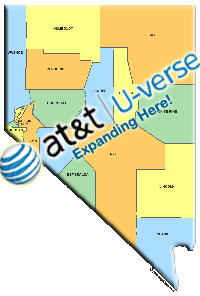
That's not all that expanded in Reno... customer's broadband bills faced $1/GB overlimit penalties as part of an Internet Overcharging experiment
AT&T’s experiment with usage caps appears to have lost them loyal customers, and generated numerous complaints against AT&T with the Better Business Bureau regional offices in Nevada and Texas for false advertising. Now there are indications AT&T will wrap up the entire experiment by this April and “study the results.” Stop the Cap! reader John wrote to say the nightmare may be ending… for now. At least one of our readers arguing with intransigent AT&T executives heard likewise.
AT&T last year subjected Beaumont, Texas and Reno, Nevada to a trial forcing a usage allowance between 20-150 gigabytes per month on customers, depending on the type of broadband plan selected. The proposed overlimit fee? $1.00 per gigabyte, although problems with their usage meter often kept overlimit fees off customer bills.
We’ve documented the howls of complaints from customers who were falsely sold an “unlimited” plan from AT&T and were never notified, or notified after signing up, of the existence of the Internet Overcharging scheme. Some customers received express mail letters officially notifying them of the scheme, others received robocalls. Complaints to the Better Business Bureau usually got any excess charges refunded, and some managed to secure a complete exemption from the usage cap trial, under threat of canceling their accounts.
Stop the Cap! reader Robin is a typical example of a customer who was sold a bill of goods by AT&T’s marketing, only to be punished with the fine print after signing on the dotted line.
“I just got my Express letter in the mail today. My internet was hooked up yesterday – no one ever said anything about any cap! I was in shock when I received the letter in the mail, I have never heard of anything like this. I live about 30 minutes out of Reno. Needless to say I am very very upset and trying to figure out what I am going to do now as I know I will go over the cap every month, I can’t afford that and I can’t afford cable internet at this time either. AT&T sucks and so does their customer service.”
Robin joins many other customers in both communities stuck in a trial that even some AT&T customer service representatives don’t understand. Robin’s calls to customer service met with claims the account could not be found, and transfers to four different AT&T departments before being able to address the usage cap surprise.
Albert, another reader, was similarly surprised.
“They are fraudulent in every respect. The state attorney should look into this. They say “unlimited” and when you sign up, they send you a little email saying you are screwed [with the trial],” he writes.
AT&T’s response to Albert was essentially “tough cookies” and if he didn’t like it, he could cancel.
Our readers in Beaumont went through the same AT&T Confusion Circus, transferred between departments until someone recognized the caller was a lucky winner of an Internet Overcharging experiment.
In both cities, delivering an effective message of customer contempt with AT&T’s usage cap scheme means filing a complaint with the Better Business Bureau. As an accredited member, AT&T values its rating very highly, and targeting complaints to the Bureau forces them to spend time and money to respond. Better yet, AT&T executives don’t like it one bit, as Albert writes:
“Go to the Southern Nevada Better Business Bureau and file a complaint. I just had the VP of Regional West of AT&T call. She was pissed that I filed a complaint, and now she has to personally reply. She hung up on me.”
Being an active consumer willing to make your voice heard is an effective way to deliver the message pricing and usage tricks and traps are unacceptable. Better yet, it annoys providers with dollar signs in their eyes, especially when canceling your service.
Albert was told the nightmare ends April 1st, when the trial wraps up, but now is the time to deliver the final protest AT&T cannot ignore.
April 1st is an ironic date — the first anniversary of Time Warner Cable sharing word of its own Internet Overcharging experiment in Austin, San Antonio, Greensboro, NC and Rochester, NY. After two weeks of protest, Time Warner Cable shelved their experiment.
If you’re a resident of Reno or Beaumont, it’s critically important to deliver AT&T a message they can understand:
- Contact the local media and request they publicize the ongoing controversy over Internet Overcharging schemes;
- Contact your local and federal elected officials and let them know AT&T’s schemes are unacceptable. See our “Take Action” section regarding support for legislation that would outlaw such schemes;
- File a detailed complaint with the Better Business Bureau, particularly emphasizing any lack of disclosure about the experiment, bait and switch advertising, ripoff pricing, etc. Demand an immediate and full refund for any overage charges and a free pass to cancel AT&T services without any early termination fees.
- Reno residents — contact Barbara DiCianno at 775-334-3112. She is the mayor’s assistant. Call her and ask to have an investigation launched regarding AT&T’s discrimination against Reno with overcharging schemes that put the city at a distinct broadband disadvantage. Local elected officials can deliver a strong political message to AT&T that such overcharging schemes will lead to robust support for re-regulation of AT&T’s broadband business to protect consumers.
- Tell AT&T you will never remain a customer of a provider that has Internet Overcharging pricing schemes. Tell them in no uncertain terms usage limits and usage based billing are unacceptable, and you will cancel service the moment they attempt to implement either.
A year ago, it was the residents of Beaumont and the other cities impacted by Time Warner Cable’s overcharging scheme that fought on the front line to protect every Time Warner Cable customer from facing a tripling of their price for broadband service. Today it’s Reno and Beaumont fighting for AT&T customers, both inside their own communities and those nationwide. As Albert reminds us:
“We will be the ones that determine if this continues or stops here and now.”


 Subscribe
Subscribe





